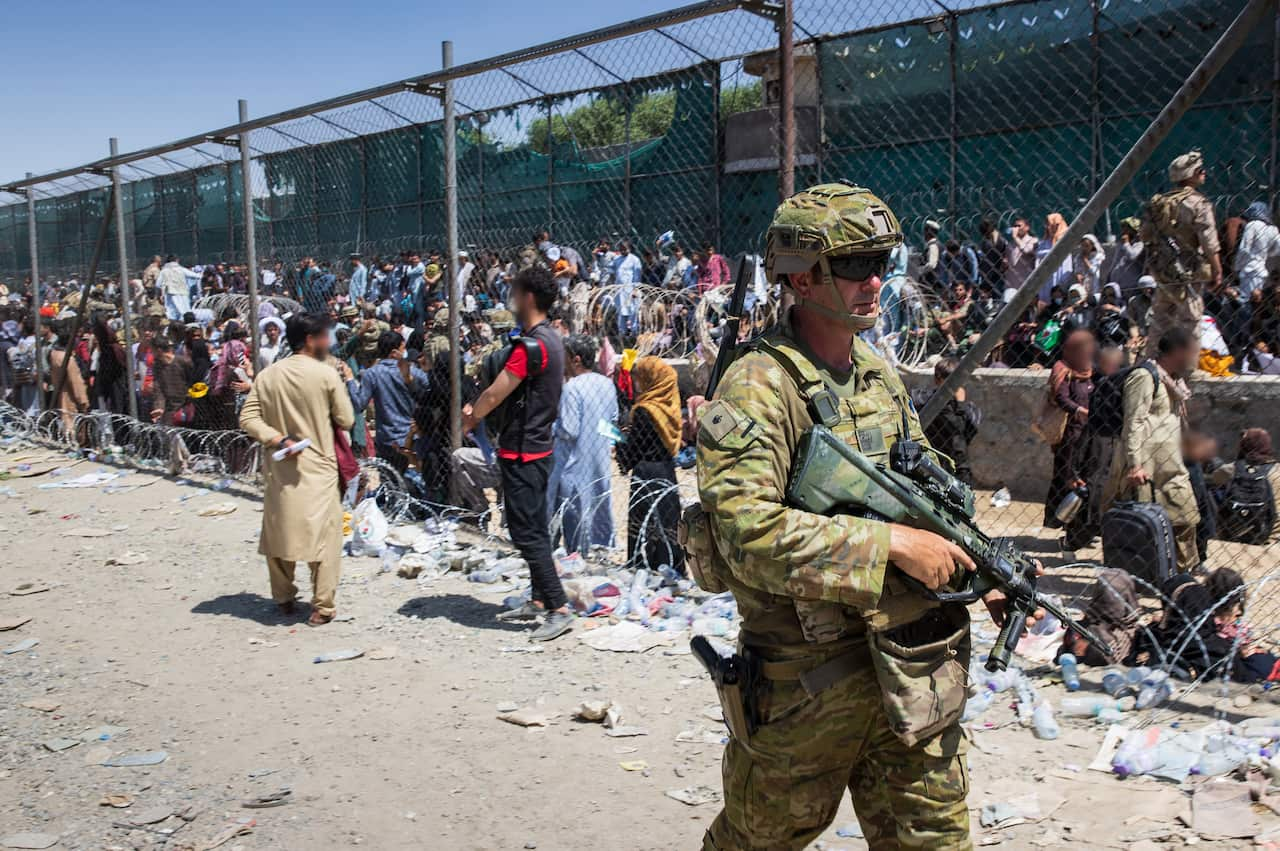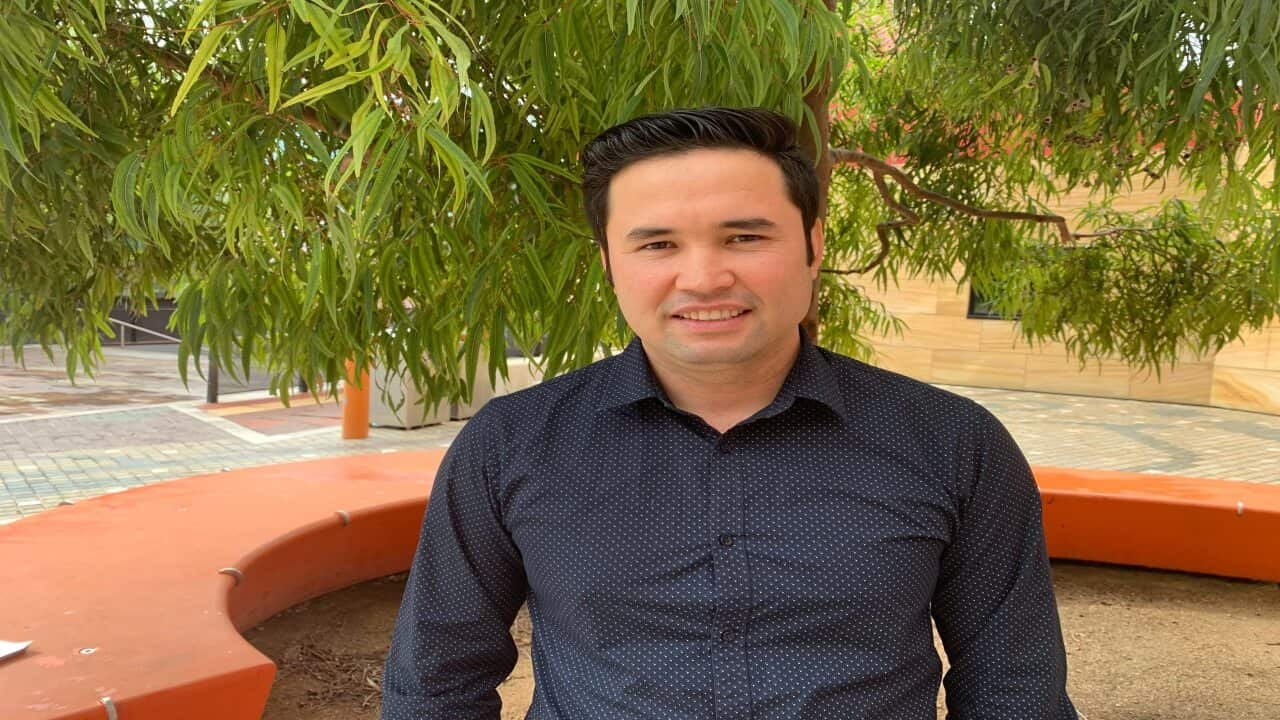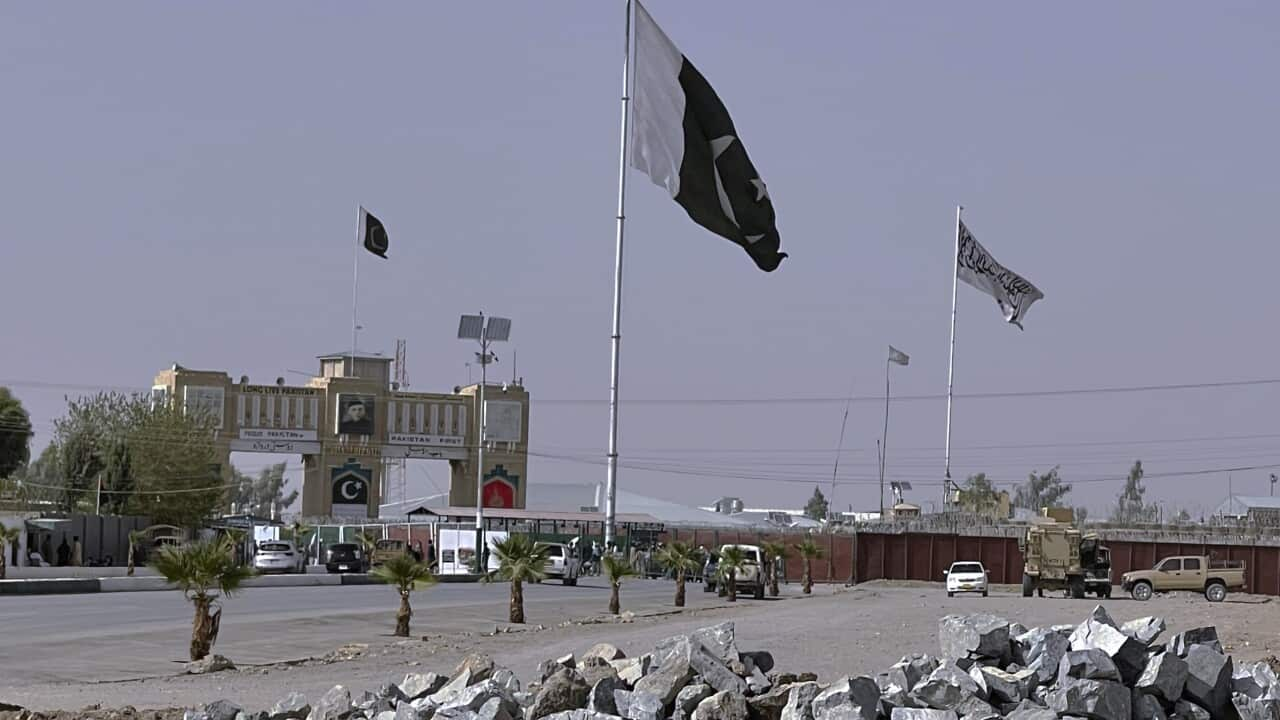Highlights
- Australia evacuated around 4,100 people on 32 flights from Kabul between 18 and 26 August
- Iman fled Kabul with six family members but her father was left behind in the chaos at the airport
- Iman is calling on the Australian government to evacuate separated family members who are at risk in Afghanistan
Iman* and six members of her family departed Afghanistan on an evacuation flight in August.
The Australian citizen, who is currently quarantining in a Queensland hotel, told SBS Urdu she fears for her father’s safety after he was left behind amid chaotic scenes at Kabul airport.
Australia evacuated around 4,100 people on 32 flights from Kabul between 18 and 26 August.
The Australian Department of Foreign Affairs (DFAT) called it one of the largest humanitarian airlift operations in the country's history.
Iman is now pleading with the federal government to find a way to reunite separated families.
Extended stay
Iman had returned to Afghanistan in March 2020 to visit her parents after an extended period of separation.
When Australia closed its borders due to the COVID pandemic, she took a job in Kabul to be with her family.
"Kabul was not very bad in terms of security at that time," she said.
That all changed in mid-August this year when the Taliban seized control of Kandahar and Herat provinces, and Iman was notified by the Australian consular officials to prepare for evacuation.
She said it was unimaginable for her close-knit family to leave anyone behind.
"My family had been exposed in the neighbourhood as being the relation of an Australian citizen, and it was widely known that my father was a government servant," she said. Fall of Kabul
Fall of Kabul

Royal Australian Regiment assisting DFAT in locating Afghan Australian visa holders attempting to enter Kabul Airport Friday, August 27, 2021. Source: AAP/Australian Defence Force
Iman said it was a “tense, but still normal morning” when she left for work on 15 August, the day Taliban forces took control of Afghanistan's capital city.
“I was attending a work meeting when the alarm rang. We were advised to leave the office immediately due to the high security risk. We just collected the necessary documents and left.
The situation was indescribable. Traffic was in chaos; people were in a panic
When Iman reached home, she found her family glued to the news. They could hear gunshots and sirens outside.
The next day news broke that Afghan President Ashraf Ghani had fled the country.
‘No choice but to leave’
Iman was notified to attend the airport for evacuation on 17 August.
She was told the airport was under the control of the US and Allied Forces, but that the situation could change at any time.
To reach the airport, they would also need to pass through two Taliban security checkpoints.
"It was one of the hardest decisions of my life," she said.
“We all had to make two commitments. Firstly, if I was to depart, then all family members would need to leave with me; and secondly, if any of the adults were left behind at any point, then the rest of us must move on to get out of Afghanistan.
“We had no choice but to leave.”
Iman left home with seven of her immediate family members: her father and mother, her brother, his wife and their two children. Without visas, they placed their hopes on being granted an exemption to travel on humanitarian grounds.
She said that while her home was usually only a ten minute's drive from the airport, the trip that day took several hours as road closures forced them to travel on foot.
“We took just one backpack each, the Quran, food for the children and water. We left everything else behind,” she said.
“At that time, we did not even think about which country we would go to, as we only wanted to leave Afghanistan to go to any safe country.
“We took the narrow back streets. Passing the Taliban checkpoints was a nightmare. We had to wait almost an hour as the men on duty alleged that everyone was bringing fake documents.”
Eventually, one person verified her Australian passport.
Iman and her family were allowed to reach the third and final gate controlled by US army personnel.
However, as they prepared to board the US military plane bound for Qatar, Iman’s father became separated in the crowd.
“My father was trying to protect us all by following from behind. When we were allowed to enter, my father was still behind the checkpoint as the crowd surged forward. The Americans started firing to disperse the crowd and shut the gate.
My father could not come in and we could not go back. We yelled, shouted, and cried, but there was nothing we could do
“You cannot imagine how painful it is to leave a loved one behind and have no contact for three days. We were not even sure if he was alive.”
LISTEN TO

'We had no choice but to leave': Story of an Australian who witnessed the fall of Kabul
SBS Urdu
20:23

Iman's family board a plane from Qatar towards their final destination, Australia. Source: Iman
Iman said she wants to make a compassionate appeal to the Australian government, on behalf of all those affected, to prioritise efforts to reunite separated families.
"I would like to request the Department of Immigration to provide clear information and visa pathways for the immediate family members of evacuees who were left behind," she added.
A spokesperson for the Department of Home Affairs declined to comment on Iman’s case but told SBS Urdu that particular priority will be given to persecuted minorities, women and children and those who have links to Australia.
"We ask the media to respect that we are unable to give detailed information related to the situation at this time - including information related to arrival times and locations, visa grants or information about specific individuals."
The spokesperson outlined Australia’s response as follows:
- The Australian Government recognises the importance of family reunions for refugees and humanitarian entrants.
- A key aim of Australia’s Humanitarian Program is to reunite refugees and people who are in refugee-like situations overseas with their families in Australia through ‘split family’ provisions and the Special Humanitarian Program.
- We will also continue to utilise our close working relationship with the United Nations High Commission for Refugees (UHNCR) to identify those Afghans most in need.
- The Government is working with Afghan community leaders in Australia, and leading refugee advocates and service providers to welcome people from Afghanistan to Australia and support their settlement.
Last month, sent a joint letter to all members of parliament and senators calling on them to take urgent action in Afghanistan.
The letter, signed by over 300 Australian organisations, businesses and community groups, appealed to the Australian government to assist Afghan Australians, including people with urgent family reunion applications for relatives who are at particular risk of being targeted by the Taliban.

Australian citizens and visa holders on board a Royal Australian Air Force C-17A as Australian Army Infantry personnel provide security at Kabul airport. Source: Australian Defence Force
Australians in Afghanistan should monitor advice on and subscribe for updates. Australian citizens, permanent residents and their immediate families should .
- Visa holders or visa and citizenship applicants in Afghanistan can call the Department of Home Affairs on +61 2 6196 0196
- Listen to Urdu Podcasts on , ,
- Learn or make it your home page.
- SBS Urdu is broadcast every Wednesday and Sunday at 6 PM (AEST).


